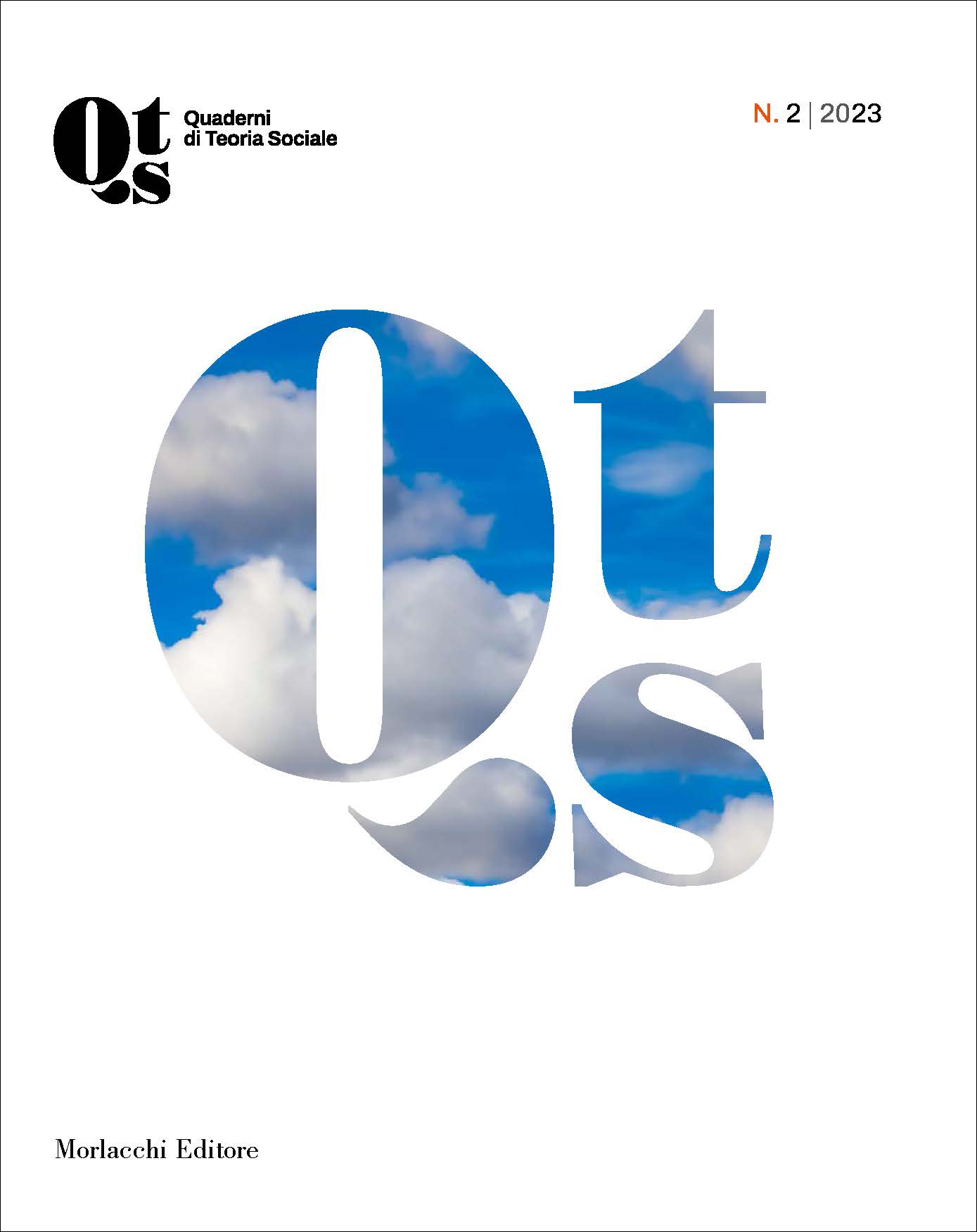“Quell’istante dove tutto ritorna possibile”. Le funzioni del negativo tra istituzioni immunitarie e movimenti sociali
DOI:
https://doi.org/10.57611/qts.v2i2.296Parole chiave:
society’s immune system, social contradictions, conflicts, affirmative negation, social movementsAbstract
Luhmann’s sociological theory has been received and criticized in many respects. Among the topics that have not been considered as they deserve, there is one particularly relevant: that of social immunology. In the early 1980s, Luhmann began to imagine society’s immune system as being made up of symbols of rejection – the universe of ‘No’, in relation to that of ‘Yes’. As he wrote in the chapter of Soziale Systeme dedicated to contradictions and conflicts: “the system does not immunize itself against ‘no’, but rather with the help of ‘no’; it is not protected from changes, but thanks to changes”.The immune system does not protect structures (always transient), but only autopoiesis: it protects from annihilation through denial. Social contradictions perform the alarm function “destroying for an instant the global claim of the system to be already reduced and ordered complexity. For an instant, the indeterminate complexity in which everything is possible is re-established”. In the following years Luhmann took up those seminal reflections to develop a theory where the ‘negative’ – where everything is possible – becomes an affirmative form and where the warning signals that society needs to react to highly problematic situations take on ever greater importance. With the theory of social movements, risk, and danger, Luhmann will then develop the foundations for understanding why and how society generates a real and capillary immune system.
Riferimenti bibliografici
Alexander J., 2018 Trauma: La rappresentazione sociale del dolore, Meltemi, Roma.
Andersen N.A. and Stenner P., 2019 Social Immune Mechanism: Luhmann and Potentialization Technologies, Theory Culture & Society, 37, pp. 1-25.
- 2023 How the Welfare State Tries to Protect Itself Against the law: Luhmann and new Forms of Social Immune Mechanism, Law Critique.
Buckley, W., 1976 Sociologia e teoria dei sistemi, Rosenberg &Sellier, Torino.
Cevolini, A., 2007 Erynnerung. Evoluzione e semantica del diritto arcaico, in Cevolini [a cura], Potere e modernità, Franco Angeli, Milano
Esposito, E., 2017 Critique without crisis: Systems theory as a critical sociology, Thesis Eleven, 143, 1, pp. 18-27.
Esposito R., 2018 Politica e negazione, Einaudi, Torino.
- 2022 Immunità comune, Einaudi, Torino.
Freund, J., 1995 Il Terzo, il nemico, il conflitto. Materiali per una teoria del Politico, Giuffré, Milano.
Habermas, J., 2022 Una storia della filosofia. Vol. 1: Per una genealogia del pensiero postmetafisico, Feltrinelli, Milano.
Lefort, C., 2007 Saggi sul politico, Il Ponte, Città di Castello.
Luhmann, N., 1983 Ordine e conflitto, Il Centauro, 8, pp. 3-11
- 1985 Conflitto e diritto, Laboratorio Politico, 2, pp. 5-25.
- 1990 Sistemi sociali: Fondamenti di una teoria generale, il Mulino, Bologna [or. 1984].
- 1996 Sociologia del rischio, Bruno Mondadori, Milano.
- 1997a Theory of Society I, Stanford UP, California.
- 1997b Theory of Society II, Stanford UP, California.
- 2012 Il diritto della società, Giappichelli, Torino.
- 2014 Introduzione alla teoria della società, Pensa Multimedia, Lecce.
- 2017 Protesta, Mimesis, Milano.
Lyotard J.-F., 1985 Il dissidio, Feltrinelli, Milano.
Prandini, R. e Teubner. G., 2022 La [auto]sovversione del diritto: ambiguità e paradossi del sistema immunitario della società, FrancoAngeli, Milano.
Roznai Y., 2016 Unconstitutional Constitutional Amendments, Oxford University Press, Oxford.
Supiot A., 2006 Homo Juridicus. Saggio sulla funzione antropologica del diritto, Bruno Mondadori, Milano.
Taylor C., 2004 Gli immaginari sociali moderni, Meltemi, Roma.
Varela F., 1979 Principals of Biological Autonomy, Elsevier North Holland, New York.
- 1985 The Emergent Self, in Brockma J. (a cura di), The Third Culture: Beyond the Scientific Revolution, Touchstone, New York, pp. 209-222.
##submission.downloads##
Pubblicato
Fascicolo
Sezione
Licenza
Copyright (c) 2023 Riccardo Prandini

Questo lavoro è fornito con la licenza Creative Commons Attribuzione - Non commerciale 4.0 Internazionale.
<a rel="license" href="http://creativecommons.org/licenses/by-nc/4.0/"><img alt="Licenza Creative Commons" style="border-width:0" src="https://i.creativecommons.org/l/by-nc/4.0/88x31.png" /></a><br />Quest'opera è distribuita con Licenza <a rel="license" href="http://creativecommons.org/licenses/by-nc/4.0/">Creative Commons Attribuzione - Non commerciale 4.0 Internazionale</a>.






